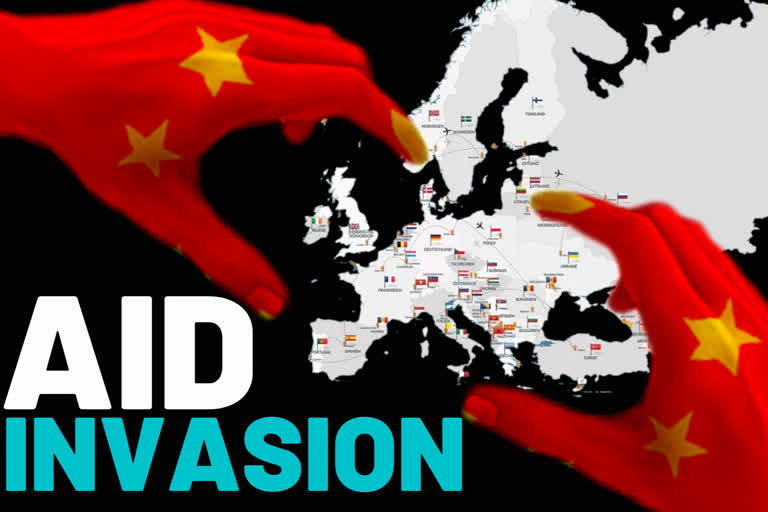While Beijing struggles elsewhere to polish its image tarnished by its initial handling of the coronavirus outbreak, the country has no problem maintaining its hard-won influence in Eastern Europe, where it battles for clout with the EU as well as with Russia in countries like Serbia.
Read also: Could old vaccines for other germs protect against COVID-19?
China was criticised by many in the West for its early mishandling of the health crisis due to politically motivated foot-dragging while the virus raced through a major province and its capital, Wuhan. Now it is seeking to change perceptions through "mask diplomacy" — a combination of soft power policy, political messaging and aid that is designed to portray Beijing as a generous and efficient ally.
Read also: Virus exposes US inequality; will it spur lasting remedies?
Beijing for years has been increasing its political and economic influence in southeastern Europe through its Belt and Road global investment projects. Its image-polishing after the outbreak found fertile ground in places like Serbia and Hungary, whose populist leaders nurture close ties with Beijing or Moscow.
The aid shipments also drew praise in Italy, Spain, the Netherlands and Slovakia, although some Chinese shipments of coronavirus testing kits and face masks turned out to be faulty or defective.
"We must be aware there is a geopolitical component, including a struggle for influence, through spinning and the politics of generosity," EU's top foreign policy official Josep Borrell recently wrote in a blog, referring to China. "Armed with facts, we need to defend Europe against its detractors."
Chinese officials have repeatedly rejected claims that Beijing is seeking political gains by providing medical aid to other countries, saying the allegations result from deep-rooted misperceptions of China's goals in the West.
While the EU's 27 nations were busy battling the virus amid a lack of equipment and protective gear, shipments from China were praised even when they were paid for.
In Serbia, a candidate for EU membership, officials and state-controlled media have played down the millions of euros in grants and loans from Brussels and praised Chinese deliveries, donations and cash purchases. Opposition groups have demanded that the aid from China be disclosed and stacked up against the EU's apparently much larger assistance, but those calls have been ignored.
The pro-China narrative included billboards supporting Chinese President Xi Jinping, whom Serbian President Aleksandar Vucic routinely describes as his "brother."
"European solidarity does not exist. Only China can help," Vucic said last month while announcing a nationwide state of emergency that gave him expanded powers in the health crisis.
Still, a suggestion by Serbia's prime minister that a monument be erected honouring the country's friendship with China during the outbreak drew a negative response from some pro-Western Serbs.
"Are we to build monuments for those who have triggered the global pandemic spread, including Serbia, and lied about it in the process?," one commentator asked.
Both Serbia and Hungary have been important gateways to Europe for China through its infrastructure and investment projects.
Beijing's investments in Serbia include an estimated $6 billion in loans for building highways, railroads and power plants as well as contracts for the introduction of a 5-G network and facial recognition surveillance equipment. US officials have warned of Beijing's "debt trap" diplomacy that could cost them their sovereignty if they fail to service the loans.
Hungary's authoritarian government has repeatedly praised China and other Asian countries, thanking them for supplying masks, breathing machines and other equipment needed in the pandemic.
At the same time, Hungarian Prime Minister Viktor Orban and other ministers have downplayed assistance from fellow EU members and the bloc and have belittled those criticising the extraordinary powers given to Hungary's leadership during the state of emergency declared due to the pandemic.
"All of Europe, including western Europe, is always extraordinarily critical and often ready to educate and lecture about the essence of democracy, (but) everyone is standing in line in China for the products needed for health protection," Foreign Minister Peter Szijjarto said last week in Parliament. "So, it's possible that after the end of the coronavirus, European policies regarding Eastern relations may have to be slightly reassessed."
A group of experts monitoring Beijing's presence in southeastern Europe warned in a report this month that "China has been increasingly active in political, economic and societal domains" in the region.
Czech President Milos Zeman, known for his pro-Russian and pro-Beijing views, said in a televised address on March 19 that "China was the only country that helped us have the (protective) gear delivered."
China expert Martin Hala countered by criticising what he called a "huge propaganda campaign that accompanies the so-called aid" from Beijing. He told Czech public television that it was not aid but "a normal commercial delivery."
AP



